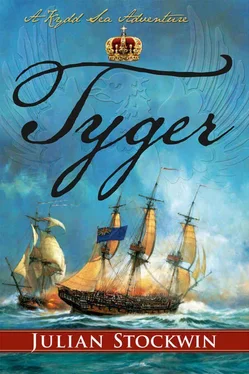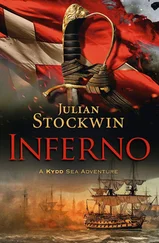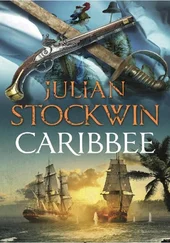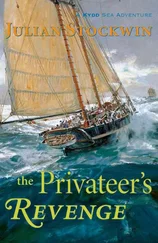In the boat were other witnesses of like rank, with two older captains who were to sit in judgement. They avoided each other’s gaze until they reached the venerable ship’s side and disembarked one by one.
An immaculate side-party in white gloves piped them aboard, then the captain of Gladiator welcomed them and saw the witnesses aft to a special area where they would wait until called.
The great cabin was arranged with a long table and chairs, several side-chairs and small tables for officials and attendants.
One by one the members of the court filed in, in strict order of seniority, the glitter of gold lace and the steely gleam of the sword of the provost marshal adding to the solemn majesty of the moment.
Last to enter was the president of the court, Admiral Young, who took his high-backed chair with ponderous deliberation. Next to him was the judge advocate who would advise on points of law and procedure. At one end was a bewigged civilian supported by another, the prosecuting counsel for the Admiralty; at the far end two others stood beside an empty chair, Popham’s legal counsel.
After a muttered consultation the president was ready.
“Carry on, the Admiralty marshal.”
This was the warrant for proceedings, under the signature of the highest authority possible.
A clerk took up a paper and read, in a thin, reedy voice, “‘Whereas Captain Sir Home Popham left the Cape of Good Hope without orders to attack the Spanish settlement on the Rio de la Plata, now this is to command you that you take the said Sir Home Popham under arrest preparatory to his trial by court-martial for his said offence.’”
Each of the members of the court were then individually put on oath.
“Bring in the prisoner.”
Popham wore a faint smile as he stood erect before the court.
His sword was produced by the provost marshal and handed to the president.
“You are Captain Sir Home Popham?”
“I am.” The voice was calm and even. “Mr President, I have thought it advisable to seek legal assistance upon this occasion and I beg leave to ask permission of this court to have this assistance attend me during the trial.”
“Sir Home, any assistance you may require, the court is very willing to allow you.”
Popham gave a slight nod in acknowledgement, and the opening gentlemanly play was over.
Although he was not in the great cabin, Kydd knew what would be happening. A court-martial was a straightforward affair: the precise charge facing the prisoner would be read out, then the prosecution would make its case, producing the entirety of evidence in support of the charge. Following this, the defence would begin with its own evidence, then witnesses would be called and examined by both sides. On completion, after the customary closing address by the prisoner, the court would be cleared for deliberation to a verdict.
On more than one occasion Kydd had sat on courts that had opened in the morning and concluded before midday; evidence presented, witnesses heard and verdict arrived at-a man condemned to hang at the yardarm.
The president turned to the judge advocate. “The letter of complaint, if you please.”
The archaic practice was for the charges to be framed in the form of a grievance from the Admiralty to be addressed by the assembled court.
Rising to his feet and adjusting his spectacles, the learned gentleman outlined the case to the court: “‘By the commissioners for executing the office of Lord High Admiral of Great Britain and Ireland, etc., to William Young, Esquire, Admiral of the Blue, and second officer in the command of His Majesty’s ships and vessels at Portsmouth and Spithead. By command of their lordships, William Marsden, first secretary to the Admiralty.’” The words rolled out with a practised delivery.
“‘Whereas, by an order … Sir Home Popham, then captain of His Majesty’s Ship Diadem … was directed to take under his command … for the purpose of capturing the enemy’s settlements at the Cape of Good Hope in conjunction with the troops of Major General Sir David Baird … and whereas it appears from letters from the said Sir Home Popham that he was proceeding to Rio de la Plata with a view to attack the Spanish settlements for which he had no direction or authority whatsoever, and he did withdraw from the Cape the whole of the naval force which had been placed under his command for the sole purpose of protecting it, thereby leaving the Cape, which it was his duty to guard, not only exposed to attack and insult … all of which the said Sir Home Popham did notwithstanding that he had previous information of detachments of the enemy’s ships being at sea … And whereas it appears to us, that a due regard to the good of His Majesty’s service imperiously demands that so flagrant a breach of public duty should not pass unpunished.’” He flashed a glance at Popham. “‘We send herewith, for the support of the charge, the following papers, viz:
“‘The copy of an order from the lords commissioners of the Admiralty … to Sir Home Popham, to take the ships therein named under his command, and to proceed to the Cape of Good Hope …’”
Some eighteen orders and instructions were cited, and after a small cough to signify a change of tempo, the reading concluded with, “‘And we do hereby require and direct you forthwith to assemble a court-martial; which court (you being the president thereof) is hereby required and directed to enquire into the conduct of, and try the said captain, Sir Home Popham, for the offences with which he is charged accordingly. Given under our hands …’”
The judge advocate turned to the president. “Further, sir, I have here a letter directing Mr Jervis, counsel for the affairs of the Admiralty and navy, assisted by Mr Bicknell, to conduct the prosecution on the part of the Crown.”
At the opposite end of the table to Popham, a thin, predatory figure in legal robes rose and bowed briefly to the president. Before sitting he fixed an intent look on Popham.
It was crowded in the witness waiting area. Several left to stretch their legs on deck for a space. A seamed old captain sitting next to Kydd leaned sideways and whispered, “They’re no doubt making sure o’ things. That legal cove prosecuting can call old Jarvie ‘uncle,’ did ye know?”
Kydd felt dismay. Was St Vincent really going to such lengths or was it merely coincidence that his nephew was leading the prosecution? Either way, however Kydd answered as a witness, his words would doubtless be known to the implacable old admiral the same day. When under examination it would be wise to weigh what he said very carefully indeed.
“This court now sits. Pray read to the court the evidence in support of the charge.”
“Very good, Mr President. Document One. Copy of Instructions to Sir Home Popham.
“‘By the commissioners for executing the office of Lord High Admiral of the United Kingdom of Great Britain and Ireland, etc., the Lord Viscount Castlereagh, one of His Majesty’s principal secretaries of state, having, with his letter …’” He read aloud the actual instructions to Popham in the matter of preparation for the descent on Cape Colony in all their meticulous wording.
“Document Two. Copy of a letter to Sir Home Popham …”
One by one the orders and strictures that had passed out of the Admiralty from hopeful beginning to disastrous end were revealed, a damning avalanche of evidence that took nearly two hours to complete. Included were intelligence appraisals from military commanders in the field, advisories from the new governor of the colony and correspondence between the secretary of state for war and the Admiralty.
It finally ceased.
Popham had been listening politely, his faint smile still in place, but as soon as the judge advocate sat down he spoke crisply: “Mr President, I beg leave to point out that Document One is in error, sir.”
Читать дальше









